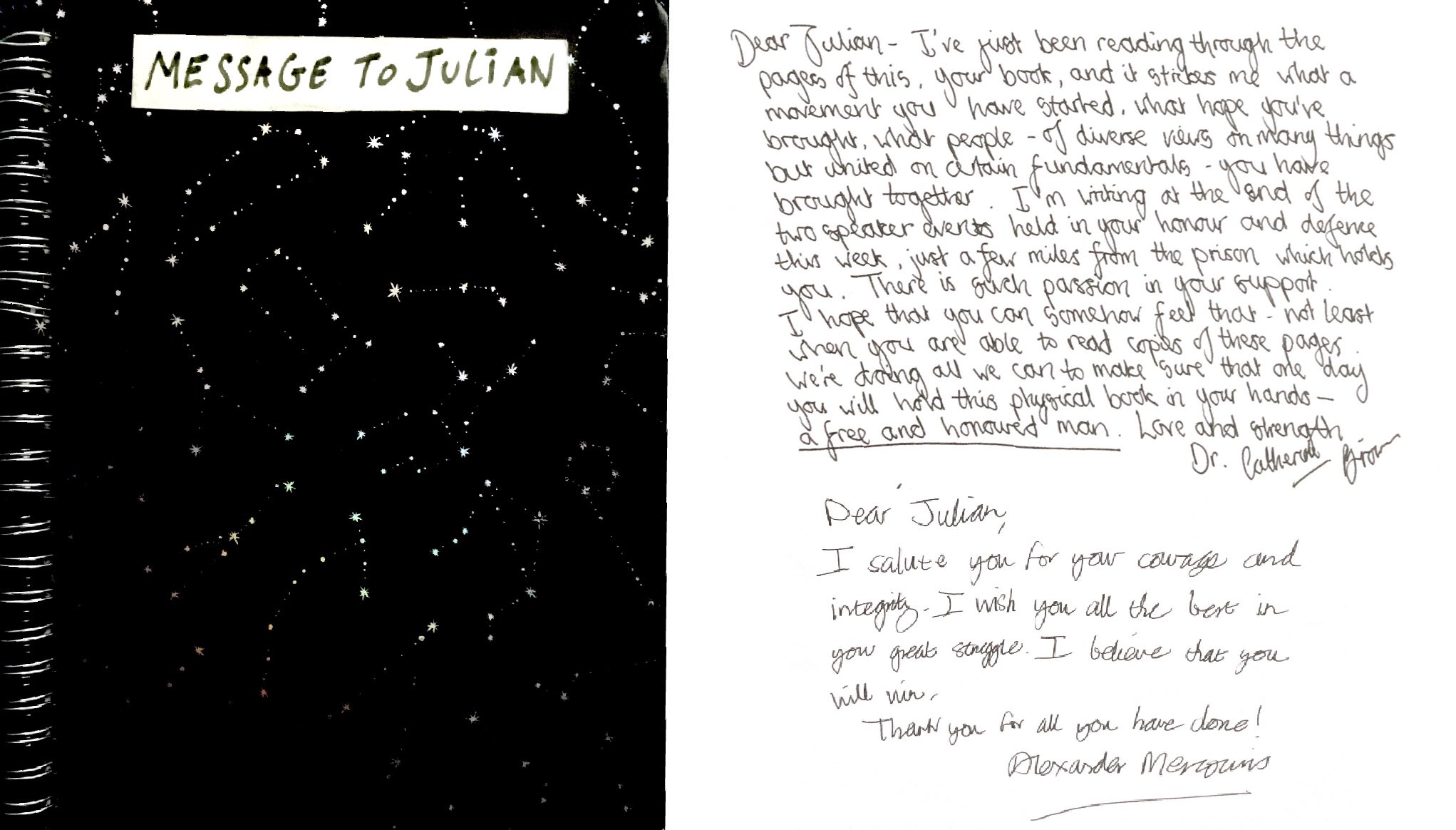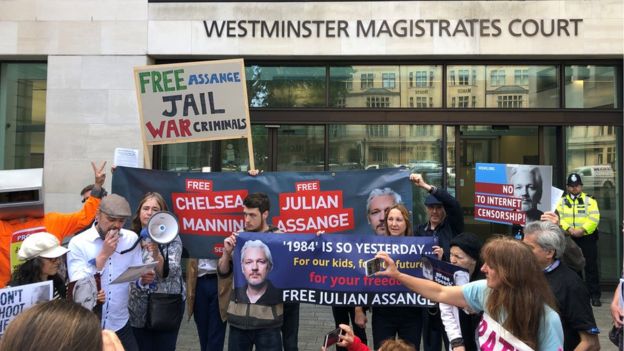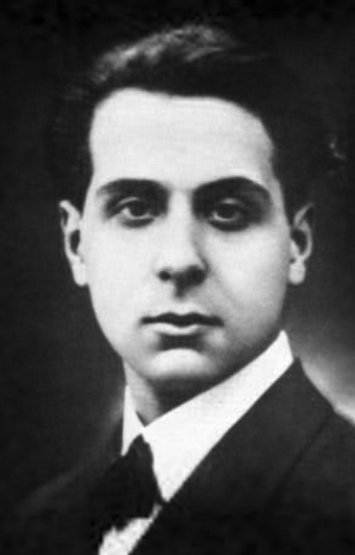Two events entitled ‘Imperialism on Trial – Free Julian Assange’ were held at the Crypt on the Green and St James’s Church, Clerkenwell, London, on Tuesday June 11th, and Wednesday June 12th, 2019, 7-10 pm, organised by Greg Sharkey.
The views expressed are the speakers’ own. I provide brief summaries of some of the speeches, and the full text of my own (about the character assassination of Assange), in order to express my support for the events, for Assange, and for Wikileaks.
The event of June 11th, including my own speech from 28.13, may be watched here.
Chris Hedges (Pulitzer Prize Winner and Presbyterian Minister)
Made the first of several references over the two evenings to George Orwell’s 1984, and asserted that Assange was currently a victim of psychological torture. ‘Julian is not being persecuted for his vices; he is being persecuted for his virtues’. The standard of the news media has degenerated since the 1980s; it creates antagonistic tribes, which is good for sales, but dangerous to society. The courts should be dealing with the crimes that Assange revealed revealed, not with Assange himself. We must not respond with violence, or by taunting the police – that isolates most people. We must make common cause with people of different political causes (the identity politics of the left separates it from the working class). We should engage in peaceful civil disobedience. We need to win over some of those in power, including the police. He concluded: ‘I do not fight fascists because I will win. I fight fascists because they are fascists.’
Fidel Navaez (Former Senior Diplomat at the Ecuadorian Embassy)
Was a diplomat at the UK Ecuadorian Embassy during most of Assange’s time there (2012-2019). Navaez described the achievements of the ‘citizens’ revolution’, which preceded the current Ecuadorian government, in the fields of the economy, education, and the fact that Ecuador became the only no-visa country in the world. During Assange’s 2,487 days at the Embassy he received nearly 1,000 visits, and gave many interviews. In December 2017 he received Ecuadorian nationality, having spent the required five years on Ecuadorian territory. It was wrongly reported that Assange was not grateful to Ecuador. When Lenin Moreno came to power, Assange’s internet and phone were removed. The current government has committed many crimes against a person granted Ecuadorian asylum, including installing espionage equipment to spy on them, defamation, and violating the principle of no refoulement.
Vivienne Westwood (Fashion Designer and Campaigner)
Westwood is a friend of Assange’s. The charges against him may be summarised as: ‘it is a crime against America to expose American war crimes.’ Our economics and politics are bankrupt – and climate change, which is not being stopped, is a result of this. A false narrative is being created by those in power, and it is up to us to resist this. She concluded by reciting her poem, ‘Fight the Narrative’.
Lauri Love (Former US Extradition Defendant)
He was politicised by War on Terror, and got involved in student politics at Glasgow University. After being expelled from the university he became engaged in online activism in 2011. He was inspired by Wikileaks, which changed journalism by making available the uncoerced truth. In October 2013 he was arrested for hacking crimes and tried for extradition to the US. He was not charged, despite misreporting otherwise. The UK police behaved as agents of US law. According to the 2003 UK extradition treaty, a prima faciecase is not required, and only the risk of the death penalty being applied definitely prevents extradition to the US. Lies and distortions were stated against him in open court. He won in the Court of Appeal, in part because of a public campaign in his support. Coercive plea bargaining is the fate of the majority of those charged in the US justice system, and US prisons are terrible; in relation to ethnic minorities, they are an extension of the plantation system, since they are a source of cheap labour. UK judges accepted that it would be ‘unjust and oppressive’ to send thither someone who has mental health problems. That has set precedent.
Tommy McKearney (Former Irish Hunger Striker)
McKearney was a hunger striker in Northern Ireland in 1980. He reminded the audience that an older imperial power than the United States is currently involved in the oppression of Assange, and recounted lesser-known parts of the history of UK imperialism, including the sending of UK troops to Vietnam after WWII in order to support French colonialism, and MI6’s involvement in the overthrow of Mossadegh in Iran. He cited examples of the UK state’s secrecy, including long periods of information classification, that have been revealed by Freedom of Information requests. The files concerning a fourteen year-old girl killed on her way back from shops during the Troubles are withheld until 2064. Certain files concerning Edward VIII and the abdication crisis are withheld until 2037. He pointed out how marginalised Ireland is in UK narrative, as demonstrated by the fact that the BBC news rarely reports on Ireland. At present, we need to be careful that our energies are not exhausted in defending Assange. We cannot depend on a free press. [Greg Sharkey noted that this visit to London was one of very few that McKearney had ever made in his life, and he paid tribute to their long friendship]
John Wight (Journalist)
Wight noted that the diverse panel on stage with him (on Tuesday 11thJune) testified to the fact that Assange’s case unified humanity. Assange had ‘pulled back the flowery curtains of democracy and human rights, behind which the savage beast of the hegemon resides’. What is taking place is a ‘slow motion execution of Julian Assange’, yet ‘our media holds the people to account on behalf of the powerful’. He criticisedThe Guardian’s supposedly ‘progressive’ journalists in their attacks on Assange, and he cited the lies that had been told in the media regarding Iraq, Libya, Urkaine, and Venezuela. Assange ‘should have been sent to Sweden long ago – to pick up the Nobel Prize alongside Chelsea Manning.’ ‘Until Julian Assange and Chelsea Manning are free, none of us are.’
Ahmed Kaballo (Journalist at Press TV)
Kaballo, a Sudanese British journalist, was recently for six weeks in Venezuela, and discovered many lies in the Western mainstream media’s coverage of the events in that country. Like many speakers over the two evenings he cited George Orwell: ‘In the age of universal deceit, telling the truth is a revolutionary act’. He informed the audience that Sudanese soldiers currently act for Saudi Arabia in their war in Yemen, and that what was formerly known as the Janjaweed militia is being rehabilitated in the West. He asserted that a civilian government in Sudan would withdraw from all involvement in Yemen.
George Galloway (Politician and Campaigner)
Galloway referred to the venue. This was near Clerkenwell Green, with its history of radical dissent, and its Karl Marx Memorial Library, recalling the UK’s proud history of providing political asylum. The venue was also St James’s Church (on Wednesday 12thJune), where the speakers spoke in front of tablets bearing the Ten Commandments, including the sixth (‘Thou shalt not kill’), and the eighth, (‘Thou shalt not steal’; he later cited Jim Flory in Orwell’s Burmese Days defining imperialism as going to others’ countries and stealing their things). Mike Pompeo’s recent comments against Jeremy Corbyn were the political counterpart of America’s legal overreach as demonstrated in the recent indictment of Assange. Nobody disputes the truth of the Wikileaks revelations; no story published by him has ever had to be withdrawn. ‘The guy who told the truth about the war crimes is behind bars, and the guys who committed those war crimes are counting their millions’. He still has faith in the UK judiciary, and thinks that the prospect of 170 years in prison for Assange may dissuade the judges from permitting his extradition. In response to Mercouris’s speech he affirmed that he knew for certain that the DNC emails were leaked rather than hacked, but that he may not give details to support this. He observed how the allegations of sex crimes have scared away from Assange’s defence many of those who would otherwise consider themselves to be anti-imperialists. He affirmed that it is not anti-American not to want to be ruled by America. He shared with the audience the fact that Henningson had been berated by a Trotskyist outside the event for appearing alongside a Stalinist, by whom he referred to Galloway himself. Galloway responded that even if he were a Stalinist, it would still be important for all those who criticise imperialism to set aside their differences and to campaign together. He read out a message of thanks from Assange’s father, who had been present at the event on the previous evening.
Ogmundur Jonasson (Former Icelandic Interior Minister)
He had attended the pro-Assange march from Buckingham Palace to Downing Street earlier that day (Wednesday 12thJune) and that observed, of all media channels, only RT were present. The sixty people who came on the march represented millions who felt similarly. He observed that one can’t take pictures at Downing Street now, as one had been able to in the past. He said that ‘I may be a populist, in the Roman sense’, and that it was, arguably, concerning that those in power now demonise ‘populism’. He had been a trade unionist and then became Interior Minister. In June 2011 he was informed by representatives of the US government that the Icelandic power industry was in danger of imminent attack by hackers, and was offered help with certain conditions. This he rejected, believing that a threat was being fabricated. He gave evidence of US spying in Iceland, and said that according to the US, ‘Wikileaks spying was hostile spying. Was this friendly spying?’
Patrick Henningsen (Journalist at 21st Century Wire)
Henningsen described as hypocritical those governments which virtue signal regarding the locking up of journalists in other countries, whilst being involved in or silent about the oppression of Assange. He deplored the near-silence from the National Union of Journalists and Amnesty International concerning his case. He observed that Trump currently wants to pardon US war criminals, and that the wrong people are therefore in prison. He was recently in Iraq, and described the sense of depression that exists in those areas which will not be rebuilt. He asserted that the West punishes countries for trying to become postcolonial. He observed the legal gymnastics being engaged in by the US to construct a case against Assange. His extraction from the Ecuadorian Embassy had constituted rendition. If extradited, his case would be heard in Virginia, where the jury would be drawn from a population that contains many state employees, and where the judge has a reputation for harshness on national security issues. Even if there is no extradition, the indictments will have a chilling effect, just like the ‘phantom indictment’ of twelve Russians. ‘This battle may be won in the courts, but the war will be won in the court of public opinion. We have to wage a relentless defence.’
Clare Daly (Irish TD & MEP)
The phrase ‘speaking truth to power’ misses the points. Power knowsthe truth; it just does not wish it to be known. The Irish government unfortunately does not wish to take any position on Assange. The progressive left is also regrettably uninterested. She will use her new platform at the European Parliament to speak in Assange’s defence. The mainstream media did not come to the press conference (held earlier that day, on Wednesday 12thJune 2019), despite the great speakers that were available to interview. Shannon airport is being used by US war planes in transit, and by civilian planes filled with US soldiers with their weapons. The US does not permit the Irish to board these planes to inspect them. Her recent visits to Syria, Iran, Iraq and Venezuela have all falsified the narratives being retailed in the mainstream media.
Alexander Mercouris (Journalist at The Duran)
The first US indictment (for collaboration with Manning to hack a password) criminalises the journalistic protection of sources as spying. The more recent indictment is ‘the real one’, and it is in one sense a relief that it has finally been made – Assange’s defence team now know what they are fighting. In 2017 Mike Pompeo, when head of the CIA, called Wikileaks an ‘intelligence agency’. The recent indictment conforms with that, in calling Assange the head of an intelligence agency (its first sentence contains the phrase ‘an intelligence agency of the people’). This is the US’s way of getting around the fact that Assange is a journalist protected by the First Amendment. His extradition would set a precedent. The indictment makes him look guilty; it might have been expressed in far fewer counts. What has damaged his public reputation still more than the current indictment is the charge of collusion with Russians in publishing the DNC emails. The indictments of the 12 Russians who allegedly gave the emails to Julian Assange mention his name. However, the credibility of these indictments is lowered by the fact that they mention the GRU; the ‘GU’ is the actual post-Soviet name of Russia’s military intelligence agency, to which the twelve belong. Those indictments nowhere indicate that Assange had any idea that ‘Guccifer 2’ – who allegedly provided the emails to Assange – was connected to Russia, and Assange is not named as a co-conspirator. On 14thJuly 2016, Guccifer 2 allegedly gave Assange access to an archive containing the emails, and on 22ndJuly 2016 the emails were published by Wikileaks. However, Assange asserts that he had the emails in June, and the Mueller Report does not rule out the possibility that the emails came to Assange from another source: ‘The Office cannot rule out that stolen documents were transferred to WikiLeaks through intermediaries who visited during the summer of 2016’. The recent indictment asserts that Assange endangered people, but provides only the flimsiest of evidence for this, and cites nobody who has actually been harmed. It is doubtful that Assange can now have a fair trial, given that he has been publicly branded by the now Secretary of State, Mike Pompeo, as a spy.
Neil Clark (Journalist)
Clark imitated Blair, Gove, Johnson, Trump, the Duke of Edinburgh and Prince Charles in turn, satirically representing their imagined views on Assange.
Catherine Brown (English literature academic)
I want to talk about character assassination. Of course, people’s characters – their reputations – are harder to kill than their bodies. And, unlike with bodies, it is rarely done by just one or two assassins. Often many people collaborate in trying to kill a reputation by a thousand cuts, or at least, to weaken it to the point where people who do not know what has gone on will no longer want defend the victim from any other kind of injustice.
Character assassination consists of ad hominem and public attacks in bad faith, with the aim of discrediting someone, and therefore depriving them of sympathy, perhaps liberty, perhaps life. Character assassination can smooth the path to physical assassination, or it can be used in retrospect to justify it. It can harm its subjects directly as well as indirectly, since they may have nervous breakdowns because of it.
Character attacks have been made on Julian Assange more or less constantly since at least 2010, when Wikileaks released the Chelsea Manning evidence of US war crimes, but particularly around the time of the issue of the Swedish arrest warrant in relation to rape allegations; at the time of Assange’s entry to the Ecuadorian Embassy; at the time of his arrest this April; after the first US extradition warrant regarding conspiracy with Chelsea Manning; after the Swedish prosecutor announced that she was reopening her investigations; after the second US extradition warrant on indictments under the Espionage Act; and after the Swedish court’s decision not to issue an arrest warrant.
Character assassination is crucially not the same as the death of a reputation through as it were suicide – damage people do to their characters by their own actions. Wikileaks, for example, does not, through its leaks, assassinate characters. What it does is reveal evidence that certain powerful people’s characters are in a critical condition. It does not even editorialise to the effect that these people are ill. It, as it were, leaks their moral medical records, which, given the power that those people have, it is emphatically in the public interest to do.
It can be used against individuals, or against groups – like the blood libel against European Jews from the Middle Ages onwards. Individuals can be attacked to discredit the movement which they represent, as the rumour was spread by the British that Gandhi slept with children in order to undermine the Indian Independence movement, or indeed like Assange, whose damaged reputation extends in the first place to Wikileaks, and in the second to whistleblowers and their publishers in general.
Its effects are often permanent. Even if someone’s reputation doesn’t die it may, as it were, spend the rest of its life in a wheelchair, as people often remember accusations more vividly and permanently than any eventual exoneration. It can last for centuries.
What do we remember about Irish nationalist Charles Stewart Parnell? That he had an affair with Kitty O’Shea. And he did. And opinions of the badness of adultery vary between people. But it was weaponised by the opponents of Home Rule to damage that cause, and even today, the weapon that was used is remembered more clearly than the cause that was attacked.
It’s been going on for centuries. Some of the earliest Christian biographers of the Prophet Mohammed did it. Some Puritans did it in their lurid charges of sexual misconduct against Popes. Henry VIII’s courtiers did it in alleging that Anne Boleyn had committed incest with her brother. The French revolutionaries in their charge that Marie Antoinette had committed incest with her son. Alfred Dreyfus was accused of having many mistresses. Sex is so often an element.
And, as when you use your body to protect someone who is being physically attacked, you risk getting hurt, so those who defend Assange can find their characters being attacked – as Pamela Anderson and others have discovered. Indeed, we as Assange supporters have all been described by a Guardian journalist as, I quote, ‘cunt soup babbling on about press freedom’. And a Sunday Times journalist claimed that ‘many of those who still support Assange are hard-right nationalists’.
So what are the weapons and techniques of this process?
Fabrications, insinuations, rumours, ridicule, misleading exaggeration.
Use of accusations – whether true, half-true, or false – to distract; to taint by association; or to create uncertainty.
When any of the accusations are true, as with Parnell and Dreyfus, they are often not connected to the cause that is the ultimate subject of attack – which is why private life is so often used in campaigns that are politically-motivated.
Character attackers invariably appeal to good principles – to the principle that killing Christian children to use their blood in making Passover mazzos is not a good thing. That indulging anti-Semitism is not a good thing. That using any degree of coercion in a sexual situation is not acceptable.
But good impulses, misdirected, can be a powerful force for ill.
Partly because innocent individuals get caught up in a general charge of guilt.
The fact that anti-Semitism and sexual abuse are rife in this world not does not mean that any given person accused of them is therefore guilty.
And partly because the fact that these things are rife makes it all the more important not to taint the anti-anti-Semitic cause, or the MeToo movement, by the terrible association of a witch hunt. In the name of justice, you have to proceed justly.
Now character attacks are often done horizontally – for example between competing candidates in an election.
But in the case of Assange since he took asylum in the Ecuadorian Embassy, the attacks have been vertical – from the more to the less powerful. It’s been done by the British government, in its urging of Sweden not to drop its case against Assange when in 2013 it wanted to do so for the second time. When it discouraged the Swedes from interviewing Assange at the embassy. Or when it recently urged Sweden to apply for Assange’s extradition.
Many journalists have been involved.
They’ve engaged in misrepresentation by omission
By not telling the public those facts in the Swedish case that strongly indicate that it was being politically manipulated
That don’t mention the fact that the investigation was at first closed and Assange told he was free to leave Sweden
That it is not the case that someone has to be physically arrested in order to be charged under Swedish law
That Assange has never been charged by Sweden
Or that Sweden has a history of cooperation in rendition to the US, which led Assange to fear rendition ifhe returned to Sweden to meet allegations which seemed to have been revived in political circumstances – as his lawyer unsuccessfully argued in his defence at Southwark Crown court a few weeks ago.
Some of the accusations are rhetorically worded
As in the latest US indictment, which is repetitiously and portentously phrased and strung out to a length that itself asserts guilt.
Accusations have been made with no or little evidence
That he colluded with Russia
Is anti-Semitic
Is careless in his redaction and about US lives; though in the trial of Manning it was admitted that there was no evidence that his revelations had caused death or injury.
That he spied on Ecuador when in its embassy, as a representative of the new government asserted
That he is pro-Trump and anti-Clinton
That he didn’t change his clothes, and ate with his hands
Did not look after his cat
And smeared excrement on the embassy walls. Of the last if there were footage, as we are assured he was constantly surveilled, it has not been released.
And these things are used to ridicule him
As in the ugly descriptions of him as gibbering and gesticulating as he was removed from the Embassy, and countless cartoons and jokes on this theme.
As a journalist put it recently in what sounds like an analysis of the character assassination, but is in fact participating in it:
‘Assange was once seen as a quintessential left-wing figure, the Robin Hood of the information age; now he’s a Trump-supporting goblin who smears his own poop on walls. This makes it, shall we say, less urgent to defend him’ [Sady Doyle, Medium Politics, 16.5.19]
Why would you, in fact, give up an evening such as this one to listen to defences of an excrement-smearing cat-abusing Trump-and-Putin-loving life-endangering anti-Semitic narcissist who gibbers?
Well, there’s a clear answer.
If Assange were all of those things, I hope we would still be here to oppose his extradition to a country where he is at risk of cruel, inhuman and degrading treatment – such as the UN Special Rapporteur on Torture found Chelsea Manning to have undergone, and such as the Rapporteur has also found Assange to have undergone in his time in the embassy.
That would only be in accordance with the law, the Human Rights Act, which forbids putting people at risk of torture or the death penalty.
Many of you will remember the sixteen months that Augusto Pinochet spent under house arrest in London between October 1998 and March 2000.
If he had risked extradition to somewhere where he faced torture and an unfair trial, I hope that I would also have taken action to oppose it.
But it’s interesting to consider the parallels and differences.
If you accept Assange’s argument, as I and the UN Special Rapporteur on Torture do, that his stay at the Ecuadorian Embassy was involuntary, then both men were detained against their will.
Both feared extradition from onecountry that wasn’t their own to another.
It was reported of both that they were suffering from ill health.
UK politicians got involved in both their legal cases.
But in Pinochet’s case there was overwhelming evidencein the public domain for many of the charges that judge Balthazar Garcon of Spain brought against him, which were for crimes on a far greater magnitude than the worst that has been alleged against Assange by anyone.
In the UK press Pinochet was not the target of ridicule, nor was his behaviour in captivity the subject of speculation or rumour.
Pinochet faced extradition to a country where the maximum penalty that he might have faced would have been imprisonment, which was a signatory of the European Convention of Human Rights, and which had no reputation for the ill treatment of its prisoners at that time.
A former UK Prime Minister, his personal friend, argued publicly against Pinochet’s extradition. The House of Lords ruled otherwise, but the Home Secretary intervened and said that on medical grounds he should be returned to his country, and not stand trial in Spain.
There has, to say the least, been no such merciful intervention in Assange’s case.
In these two cases we see the differences between one in which character assassination did not take place, and one in which it did.
In both cases, Britain was found to be on the wrong side of international law, and was criticised by the UN for that.
And of course, what Assange definitely did – as opposed to what he might have done – was to reveal precisely the kinds of crimes for which Pinochet would have been tried.
But the character attacks don’t just render Assange vulnerable. They deflect attention from his revelations onto him.
It is of course easier for the human mind to focus on one human story than the fate of anonymous masses. By Assange and his highly-filmable life story, rather than the anonymous Iraqis killed by a helicopter attack in Baghdad.
Are we guilty of doing the same? And with Manning, and with Snowden? Of focusing on the filmable hero or, if you like the anti-hero, rather than the greater narrative that they revealed?
Well, I do think it’s something we have to keep in mind.
But I also think we’re justified in defending a single human being who is currently vulnerable to mistreatment and injustice in this country – though of course we should similarly defend anyone similarly placed.
We are also defending a principle, and arguing against the setting of a precedent that would be dangerous to journalistic freedom
Single people can focus a cause, in a way that helps that cause, as the case of Nelson Mandela so well demonstrates. And once he was freed, so were thousands of others.
And in this case the two injustices – the one that Assange revealed, and the one that he is victim of – are of a piece.
The international overreach of US law in the latest indictment is the counterpart to the overreach of the US military that Assange exposed.
The journalists who were until recently hostile to Assange, but who oppose the latest extradition request, are too late – they can’t undo the damage they have done. Given that the current scenario was a live possibility that Assange himself had predicted, it was at the very least reckless for them to undermine his reputation as they did.
But the worst hasn’t happened, and I pray that it won’t. As for character assassination lasting for centuries – it isn’t always like that. Consider how we remember Dreyfus – as the man who didn’t spy for Germany, but who was wrongly accused of it, on the basis simply that he was rich, had affairs, and was Jewish – all of which was in his case true but irrelevant.
I hope that history will remember Assange first for the good he did, and as a distant second as a man who faced a campaign of character assassination which failed. We are doing all that we can to ensure that it does not succeed.
=====
Two campaigners are compiling a book of messages to Julian Assange, which they plan to send to him in Belmarsh Prison in the form of photocopies. They suggest that others might wish to do the same for others, for example for Chelsea Manning. Below are two of the messages in their book.





